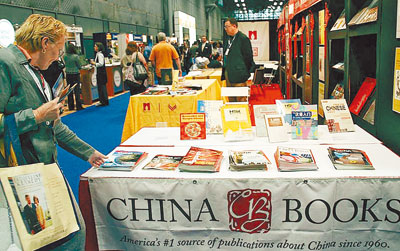
DESPITE being relatively new to the international book market, Chinese publishers are trying hard to sell their titles to overseas readers. They have made remarkable progress since the China Book International project was launched a decade ago. “We’ve developed overseas fans for Chinese works as books by Nobel laureate Mo Yan, Hans Christian Andersen award-winning Cao Wenxuan and sci-fi author Liu Cixin are widely read,” Cui Yuying, deputy director of the State Council Information Office, said at a conference of the CBI project in Chengdu, the capital of Sichuan Province, earlier this month. Readers outside China have seen a flood of Chinese works since last year, instead of the formerly scattered appearance of books on qigong (meditative exercises), cuisine and Confucius. The project was jointly launched by the State Council Information Office and the State Administration of Press, Publication, Radio, Film and Television in 2006. It was a first-of-its-kind attempt of “crossing the river by feeling the stones” to push the country’s publishers to compete and cooperate globally, says Cui. “Then, we were unsure of where to go and how to go, but we knew we were going to offer opportunities to the world to read and understand China better,” she says. The project sponsors translation and promotion fees for Chinese publishers and their foreign partners to render and publish Chinese titles overseas. Its 38 members, including publishing groups, have sold the copyright of 4,375 book titles to more than 500 publishers from 70 countries over the past decade, almost quadrupling the 2007 figure of 1,132 titles, says Cui. The initiators of the project have worked closely with 35 top publishing experts from foreign agencies and publishing houses. Speaking of the progress the project has made, Cui says the change is not only in the numbers. She says Chinese publishers are now making bigger strides in the global market, and she sees more confidence at every level. Li Yan, a vice general manager of China Publishing Group, says the group sees internationalization as one of its key strategies. It has built a team of 50 professionals from scratch for international trade and cooperation. “Formerly, we waited for foreign publishers to select what they would like to buy from us. Now we take the initiative and plan with them and for them,” Li says, adding that her group focuses on Chinese development, literature, arts and children’s books. Li Xueqian, the president of the China Children’s Press and Publishing Group, says taking Chinese writers to international book fairs and working with world-renowned illustrators are key factors that helped Cao to win the Hans Christian Andersen Award. The press has been promoting Cao and his works to a wider audience since the Bologna Book Fair in Italy in 2013. He Zhiyong, who leads the Sichuan-based Xinhua Winshare Publishing and Media Co, believes the Belt and Road Initiative also offers an opportunity to reach out to a wider market. His company has found success in developing partnerships with countries involved in the Belt and Road Initiative with regard to the novel “Nirvana in Fire,” which became a hit in Thailand earlier this year, following the phenomenal success of its TV adaptation, says He. “About 70 percent of our copyright sales are in those countries. We see the prospect of going global in this way because it is in tune with the country’s strategy,” says He. Li Zhihui, an official with the CBI office, says the project was originally intended to balance the copyright trade deficit between China and other countries. “But as it evolved, the project became inspirational and has shifted the interest of domestic publishers from the copyright trade to intellectual property cooperation and even overseas investments,” says Li Zhihui. According to Wu Shangzhi, vice minister of the State Administration of Press, Publication, Radio, Film and Television, who attended the CBI conference, the country in 2010 on average bought three copyright titles for every one that it sold, but the ratio improved to 1.6-to-1 in 2015. “Besides, China sold US$5 billion worth of digital products — online games and journals among others — overseas in 2015, compared with US$230 million in 2010,” says Wu. Chen Pengming, deputy editor-in-chief of People’s Publishing House, says that the focus of publishing houses has shifted from strengthening the copyright trade to overseas marketing. “We’re planning a series of roadshows in five cities in the English-speaking world to promote our Chinese Stories series that will be launched this year,” says Chen. To Chen’s delight, “The CPC: A History of Party Building, 1921-2015,” a title from the series of 10 books on China’s contemporary social and political history, has already grabbed the attention of its British partner. Chinese publishers have in the past decade invested in or set up more than 450 branches in 50 countries, says Cui. For instance, Xinhua Winshare established a website in New Zealand in October 2015 and is working on setting up an Australian one. “We’re hoping that readers in the two countries can get hold of newly published Chinese books quickly,” says He. Cui says, “We’re trying to meet an unprecedented demand from people eager to understand China as the country develops and its international status grows.” She says that as plans to take Chinese culture global are increasingly discussed at the highest levels, better-designed strategic plans can be expected. Liu Feng, vice general manager of Phoenix Publishing & Media, says, “What we have is not a small domestic market, and CBI provides platforms for us publishers to go further, turning publishing projects into new channels of international cooperation.” (China Daily) | 
